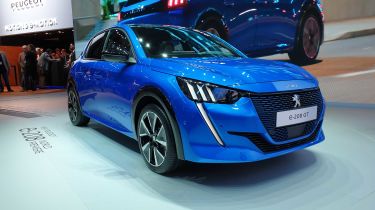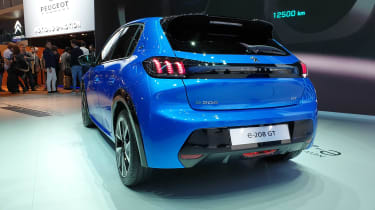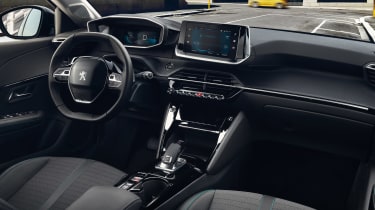Electric Peugeot e-208: prices, specs and release date
Peugeot’s first-ever electric car is capable of up to 211 miles and is available to order now with prices starting from £25,050
The new Peugeot e-208 is available to order now. The brand’s first electric car will start from £25,050 (after the Government’s £3,500 plug-in car grant), which is around £1,500 less than the Vauxhall Corsa-e but slightly more than the Renault ZOE. First deliveries are expected in early 2020.
Peugeot is offering the e-208 in the same trim levels as the petrol and diesel versions, to help normalise electric cars. All versions feature active safety braking with pedestrian detection, heated door mirrors and LED daytime running lights. The e-208 also features cabin pre-heating and automatic air conditioning but the entry-level Active does miss out on the alloy wheels that come with petrol and diesel models.
Moving up from Active (from £25,050) to Allure (£26,250) brings a lot more equipment, including alloy wheels, leather-effect seats, Peugeot’s i-Cockpit system, a head-up display and LED rear lights. GT Line starts from £28,100 and features front and rear parking assistance, ambient lighting, night-time automatic emergency braking, full LED headlights and styling upgrades. The e-208 is also available in GT trim level for £29,650, which emphasises its range-topping status with equipment like automated parking assistance, semi-autonomous driving capability, heated front seats, sat nav and a 10-inch touchscreen.
While it’s priced similarly to other electric cars, the e-208 is much more expensive than the petrol and diesel versions of the new Peugeot 208, which cost between £16,250 and £22,200 depending on engine and spec. The Vauxhall Corsa-e, which shares the e-208’s underpinnings, can be had for £270 per month after a £5,550 deposit, so it’s likely that Peugeot will offer a similar PCP finance deal.
The Peugeot e-208’s 50kWh battery is good enough for a power output of 134bhp and will provide a maximum range of 211 miles under the new, tougher WLTP testing regime. Peugeot promises that owners will be able to charge the car from 20% to 80% capacity in as little as 30 minutes using a fast charger. Two electric alternatives already on sale, the Renault ZOE and the larger Nissan Leaf, both have a 40kWh battery, so are unlikely to match the e-208's range in mixed driving. Peugeot hasn’t yet provided performance figures for the e-208, but expect sprightly acceleration.
Unlike some ZOE models, you won’t have to factor in an additional battery leasing cost - it’ll be rolled into the price of the car to simplify the process.
In addition to the fast charger time of 30 minutes for a 20-80% charge, a home charging point, which is likely to be included when you buy the car, will recharge the battery from empty to full in around eight hours. Charging the car from a standard three-pin plug socket will take more than 20 hours.
One bugbear of electric car ownership is that you tend to need multiple accounts for each of the different charging providers. However, with the e-208, Peugeot will offer a service called Free2Move, which uses one pass to access many different chargers. That’ll link to a MyPeugeot app, which will allow owners to pre-heat or cool the car before getting in, and remotely stop or start the charging process. The app will also let you pre-plan your route based on charger availability.
As is increasingly the way with electric variants, the e-208 doesn’t look too different to the standard 208. The grille features body-coloured inserts, there’s e-208 badging on the boot and the pillar next to the rear doors, and you can choose different alloy wheel designs. In this GT spec, the e-208 looks sporty and aggressive, and features gloss black styling details on the boot spoiler, door mirrors and wheel arches.
Peugeot has also said that due to the way the batteries are integrated into the floor of the car, boot space in the e-208 will be identical to the rest of the models in the 208 range.
Read more about the petrol and diesel versions of the new Peugeot 208 here, or read our review of the e-208 prototype.
Recommended
Most Popular

New BMW 3 Series ‘Neue Klasse’ takes to the ice in first official photos
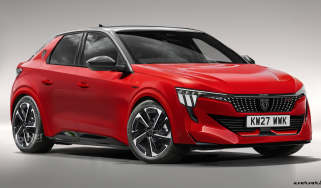
New Peugeot 208 coming soon with hot GTi version under consideration
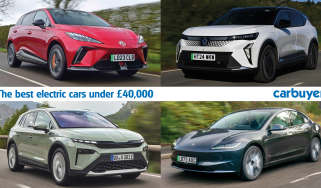
Best electric cars under £40,000 to avoid the luxury car tax
Tips & advice

Car dashboard warning lights: what does each symbol mean?

Electric car charging stations: public networks, charger types, apps and maps


